初中一般现在时
初中一般现在时及三单动词的变化规则

初中一般现在时及三单动词的变化规则
一般现在时的构成:
肯定句:主语+动词原形+其他成分
否定句:主语 + do/does not + 动词原形 + 其他成分
疑问句:(特殊疑问词) + do/does + 主语 + 动词原形 + 其他成分三单动词的变化规则:
一般现在时第三人称单数的动词变化规则是在动词原形末尾加上 -s 或 -es。
大多数动词直接在原形后加-s:
例如:play → plays
study → studies
以 -sh, -ch, -s, -x, -o结尾的动词,在原形后加 -es:
例如:watch → watches
teach → teaches
miss → misses
fix → fixes
do → does
其他一些特殊情况:
以辅音字母+y结尾的动词,将y变为i,再加-es:
例如:fly → flies
study → studies
以元音字母+y结尾的动词,直接加-s:
例如:play → plays
enjoy → enjoys
以-o结尾的动词,大多数加-es:
例如:do → does
go → goes
但也有例外,像是have、go这些常用的动词变化为has和goes。
需要注意的是,不可数名词和第三人称单数主语时,一般现在时动词不变化,依然使用动词原形:
例如:Water boils at 100 degrees Celsius.
She sings beautifully.。
初中八种时态:一般现在时
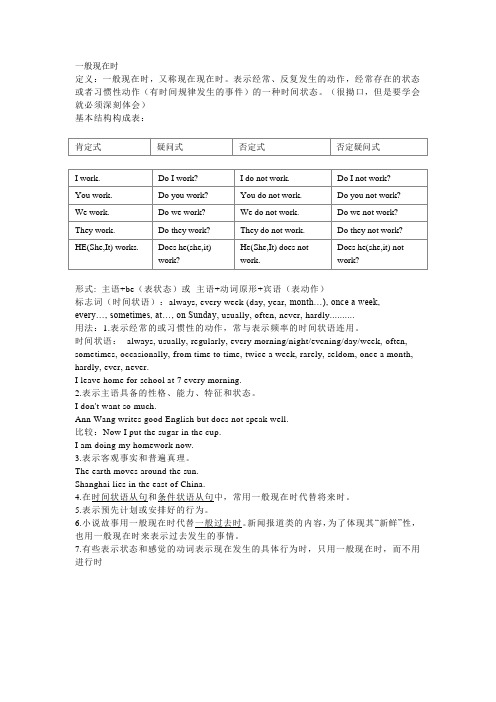
一般现在时定义:一般现在时,又称现在现在时。
表示经常、反复发生的动作,经常存在的状态或者习惯性动作(有时间规律发生的事件)的一种时间状态。
(很拗口,但是要学会就必须深刻体会)基本结构构成表:形式: 主语+be(表状态)或主语+动词原形+宾语(表动作)标志词(时间状语):always, every week (day, year, month…), once a week, every…, sometimes, at…, on Sunday, usually, often, never, hardly..........用法:1.表示经常的或习惯性的动作,常与表示频率的时间状语连用。
时间状语:always, usually, regularly, every morning/night/evening/day/week, often, sometimes, occasionally, from time to time, twice a week, rarely, seldom, once a month, hardly, ever, never.I leave home for school at 7 every morning.2.表示主语具备的性格、能力、特征和状态。
I don't want so much.Ann Wang writes good English but does not speak well.比较:Now I put the sugar in the cup.I am doing my homework now.3.表示客观事实和普遍真理。
The earth moves around the sun.Shanghai lies in the east of China.4.在时间状语从句和条件状语从句中,常用一般现在时代替将来时。
5.表示预先计划或安排好的行为。
6.小说故事用一般现在时代替一般过去时。
初中英语语法之---一般现在时

He_d_o_e_s_n_’t__st_a_y(not stay) at home on Saturdays. Lucy _d_o_e_s_n_’t__h_a_v_e(not have) sports every day.
morning.
(一)第三人称单数
用一句话概括:“非你、非我、非复数” 如 he, she, it, my father, my mother, my sister, our English teacher, Tom, Mike, Liu Jia, China, my book, etc.
she he it ;单个人名、地名;单数可数名词或者 this/that/the+单数可数名词;不定代词someone somebody,nobody,everything,something, anything;不可数名词;数字和字母
How old _a_r_eyou? Where a_r_e_ they ?
小结:be 动词的一般现在时的句式: ☺肯定句:主语+be+表语(n., adj.等)
☺否定句:主语+be+ not+表语.
☺一般疑问句:Be+主语+表语?
☺特殊疑问句:疑问词+be+主语?
2.实义动词的一般现在时句式: ☺肯定句: 主语(非三单)+v.原形+其他. 1) I _s_ta_y___ (stay) at home on Saturdays. 2) They h__a_v_e_ (have) sports every day. 3) My parents _g_iv_e_(give) me ten yuan
初中所有英语时态
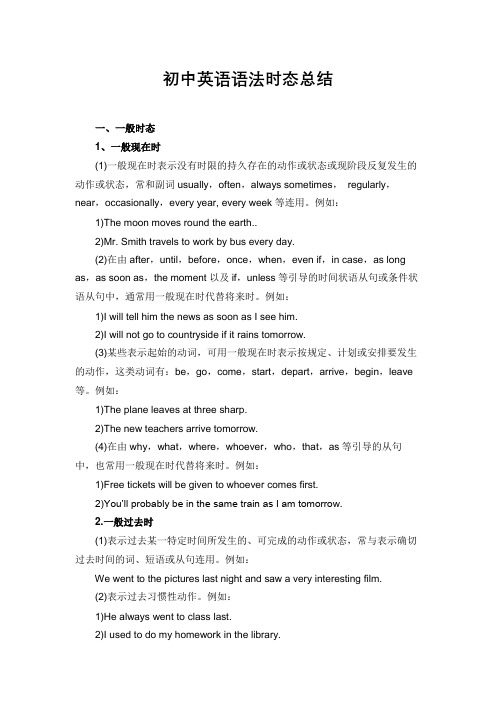
初中英语语法时态总结一、一般时态1、一般现在时(1)一般现在时表示没有时限的持久存在的动作或状态或现阶段反复发生的动作或状态,常和副词usually,often,always sometimes,regularly,near,occasionally,every year, every week等连用。
例如:1)The moon moves round the earth..2)Mr. Smith travels to work by bus every day.(2)在由after,until,before,once,when,even if,in case,as long as,as soon as,the moment以及if,unless等引导的时间状语从句或条件状语从句中,通常用一般现在时代替将来时。
例如:1)I will tell him the news as soon as I see him.2)I will not go to countryside if it rains tomorrow.(3)某些表示起始的动词,可用一般现在时表示按规定、计划或安排要发生的动作,这类动词有:be,go,come,start,depart,arrive,begin,leave 等。
例如:1)The plane leaves at three sharp.2)The new teachers arrive tomorrow.(4)在由why,what,where,whoever,who,that,as等引导的从句中,也常用一般现在时代替将来时。
例如:1)Free tickets will be given to whoever comes first.2)You’ll probably be in the same train as I am tomorrow.2.一般过去时(1)表示过去某一特定时间所发生的、可完成的动作或状态,常与表示确切过去时间的词、短语或从句连用。
初中一般现在时【讲解+练习】

一般现在时的用法一、概述一般现在时表示习惯性、经常性、反复性的动作或存有的状态。
“习惯性、经常性、反复性”是一般现在时的三大特性,它不表示特定时间内发生的事。
二、一般现在时的结构时态的结构指的是动词的变化形式。
一般现在时间有两种结构,一种是动词原形,用于主语为非第三人称时的情况;另一种为动词的第三人称单数形式,用于主语为第三人称时的情况。
Eg1.We often get up early in the morning.Eg2.My father often gets up early in the morning.三、谈谈“主语为三单,其后动词s添”在一般现在时中,当主语为第三人称单数时,谓语动词要用第三人称单数形式。
能够简单叙述为“主语为三单,其后动词s添”。
何谓第三人称单数?用一句话概括就是“非你、非我、非复数”,如he, she, it, my father, my mother, my sister, our English teacher, Tom, Mike, Liu Jia, China, my book, etc.Eg3.He sometimes goes to school by bike.Eg4.My father works in the hospital as a doctor.四、动词第三人称单数变化规则动词第三人称变化的规则与可数名词复数变化的规则相同。
规则一、一般在词尾加-s。
如:looks, puts. reads, sees, skis等。
规则二、以-o, -s, -x, -sh, -ch结尾的加-es。
如:goes, does, misses, passes, mixes, fixes, pushes, wishes, watches, teaches,等。
规则三、以辅音字母加y结尾的,变y为i,再加-es。
注意一定是辅音字母加y才变,若是元音字母加y,则直接加-s。
初中英语知识点归纳一般现在时的构成与用法
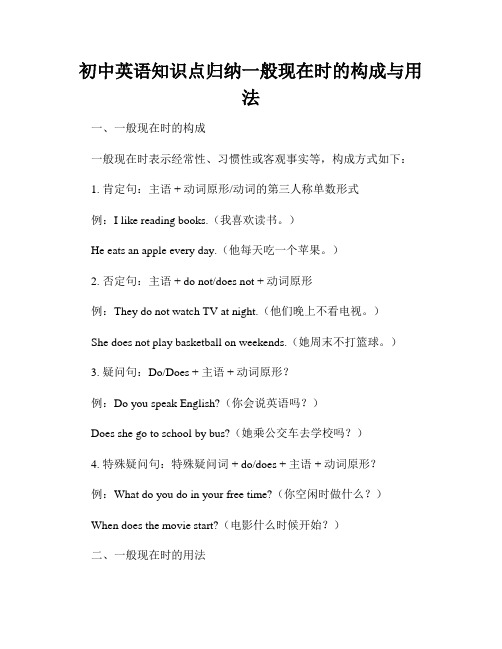
初中英语知识点归纳一般现在时的构成与用法一、一般现在时的构成一般现在时表示经常性、习惯性或客观事实等,构成方式如下:1. 肯定句:主语 + 动词原形/动词的第三人称单数形式例:I like reading books.(我喜欢读书。
)He eats an apple every day.(他每天吃一个苹果。
)2. 否定句:主语 + do not/does not + 动词原形例:They do not watch TV at night.(他们晚上不看电视。
)She does not play basketball on weekends.(她周末不打篮球。
)3. 疑问句:Do/Does + 主语 + 动词原形?例:Do you speak English?(你会说英语吗?)Does she go to school by bus?(她乘公交车去学校吗?)4. 特殊疑问句:特殊疑问词 + do/does + 主语 + 动词原形?例:What do you do in your free time?(你空闲时做什么?)When does the movie start?(电影什么时候开始?)二、一般现在时的用法一般现在时用于以下几种情况:1. 表示经常性或习惯性的动作或状态。
例:My mother often cooks dinner for us.(我妈妈经常给我们做晚饭。
)We usually go to the park on weekends.(我们通常在周末去公园。
)2. 表示客观事实、自然规律或科学真理。
例:The sun rises in the east.(太阳从东方升起。
)Water boils at 100 degrees Celsius.(水在100摄氏度沸腾。
)3. 表示现有状况或个人特征。
例:I have two cats.(我有两只猫。
)She lives in London.(她住在伦敦。
初中一般现在时讲解
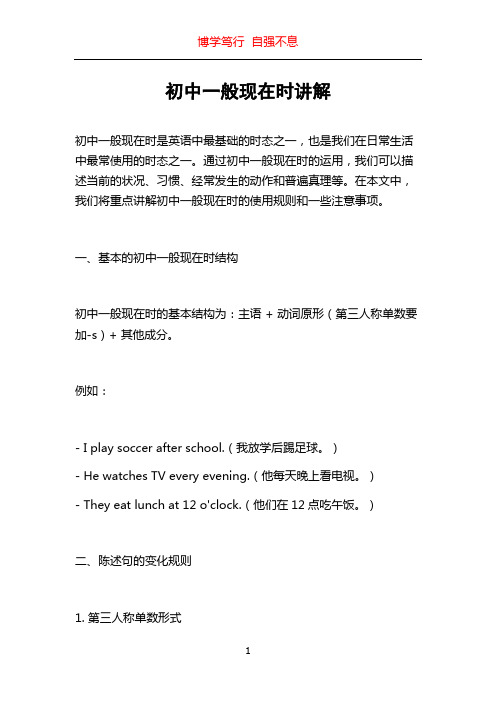
初中一般现在时讲解初中一般现在时是英语中最基础的时态之一,也是我们在日常生活中最常使用的时态之一。
通过初中一般现在时的运用,我们可以描述当前的状况、习惯、经常发生的动作和普遍真理等。
在本文中,我们将重点讲解初中一般现在时的使用规则和一些注意事项。
一、基本的初中一般现在时结构初中一般现在时的基本结构为:主语 + 动词原形(第三人称单数要加-s)+ 其他成分。
例如:- I play soccer after school.(我放学后踢足球。
)- He watches TV every evening.(他每天晚上看电视。
)- They eat lunch at 12 o'clock.(他们在12点吃午饭。
)二、陈述句的变化规则1. 第三人称单数形式在初中一般现在时中,第三人称单数(he、she、it或名词单数)的动词要变为原形加上-s。
例如:- She sings very well.(她唱得很好。
)- He plays basketball with his friends.(他和他的朋友们一起打篮球。
)- The dog barks loudly at strangers.(这条狗对陌生人叫得很大声。
)2. 不可数名词和复数名词与不可数名词一起使用时,动词保持原形。
与复数名词一起使用时,动词也保持原形。
例如:- The water tastes good.(水的味道很好。
)- The boys play soccer every Saturday.(这些男孩每个星期六踢足球。
)3. 特殊的第三人称单数形式以s、x、ch、sh和o结尾的名词通常在第三人称单数形式中加-es。
例如:- The bus goes to the city center.(这辆公交车开往市中心。
)- A box of candies is on the table.(桌子上有一盒糖果。
)- She brushes her teeth after meals.(她餐后刷牙。
初中英语一般现在时知识点

初中英语一般现在时知识点一般现在时是指在现在发生或存在的动作、状态和习惯。
以下是一般现在时的知识点:1. 形式:一般现在时的形式为主语 + 动词原形(或第三人称单数形式)、主语 + be动词原形(am, is, are)+ 动词-ing形式。
2. 第三人称单数形式:当主语是第三人称单数(he, she, it)时,动词要加 -s或 -es。
例如:She likes to play the piano.3. be动词的使用:be动词表示临时状态、习惯性状态和现有派生动词的被动语态。
例如:I am a student. They are playing soccer. The book is being read.4. 动词的形式变化:有些动词在一般现在时态中有特殊的形式变化。
例如:go -> goes, do -> does, have -> has。
5. 可数名词和不可数名词:可数名词使用单数形式,不可数名词使用单数或不变形式。
例如:She has two cats. I have a lot of water.7. 表示真理、自然现象和客观事实:一般现在时也可以用来表示真理、自然现象和客观事实。
例如:The sun rises in the east. Water boils at 100 degrees Celsius.8. 表示未来时间:一般现在时有时也可以用来表示未来安排或时间表中的事件。
例如:The train leaves at 6 o'clock tomorrow.9. 否定句和疑问句:一般现在时的否定句结构为主语 + donot/does not + 动词原形。
疑问句结构为Do/Does + 主语 + 动词原形。
以上是一般现在时的主要知识点,通过学习和掌握这些知识点,你就能正确运用一般现在时来描述现在的动作、状态和习惯。
初中语法重点:一般现在时的用法和练习详解附解析
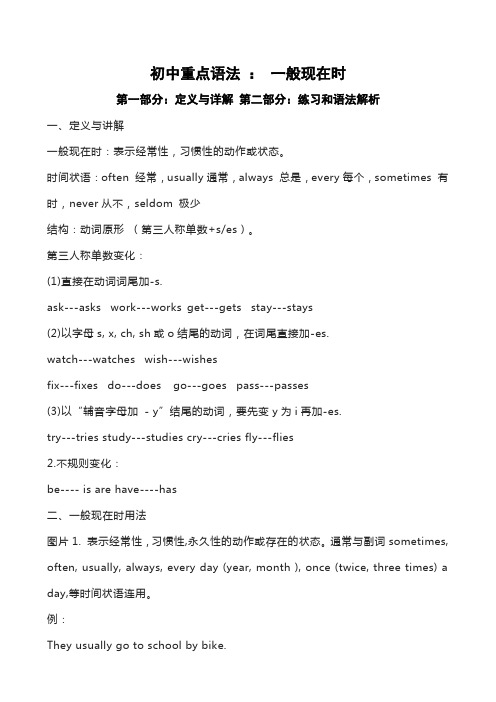
初中重点语法:一般现在时第一部分:定义与详解第二部分:练习和语法解析一、定义与讲解一般现在时:表示经常性,习惯性的动作或状态。
时间状语:often 经常,usually通常,always 总是,every每个,sometimes 有时,never从不,seldom 极少结构:动词原形(第三人称单数+s/es)。
第三人称单数变化:(1)直接在动词词尾加-s.ask---asks work---works get---gets stay---stays(2)以字母s, x, ch, sh或o结尾的动词,在词尾直接加-es.watch---watches wish---wishesfix---fixes do---does go---goes pass---passes(3)以“辅音字母加- y”结尾的动词,要先变y为i再加-es.try---tries study---studies cry---cries fly---flies2.不规则变化:be---- is are have----has二、一般现在时用法图片1. 表示经常性,习惯性,永久性的动作或存在的状态。
通常与副词sometimes, often, usually, always, every day (year, month ), once (twice, three times) a day,等时间状语连用。
例:They usually go to school by bike.I take the medicine three times a day.She helps her mother once a week.Mary’s father is a policeman.There are 50 students in my class.2. 表示客观真理,科学原理,自然现象,等客观事实或格言,谚语等。
例:The sun rises in the east and sets in the west every day.Tomorrow is Tuesday.三、一般现在时的句型转换(1)当句子中有be动词或情态动词时,则把be动词或情态动词(can,could等等)提到主语的前面变成疑问句;在be动词或情态动词后面加not变成否定句.例:①陈述句:She is a student.疑问句→Is she a student?否定句→She is not a student.②陈述句:I can swim.疑问句→Can you swim?否定句→I can not swim.(2) 当句子中即没有be动词,也没有情态动词时,则在主语前加助动词do (you,以及复数), does(单数she,he,it)变成问句;在主语后谓语动词前加助动词don’t(I,you,以及复数), doesn’t(单数she,he,it)变成否定句,助动词后的动词要变成动词原形。
初中英语语法知识之一般现在时
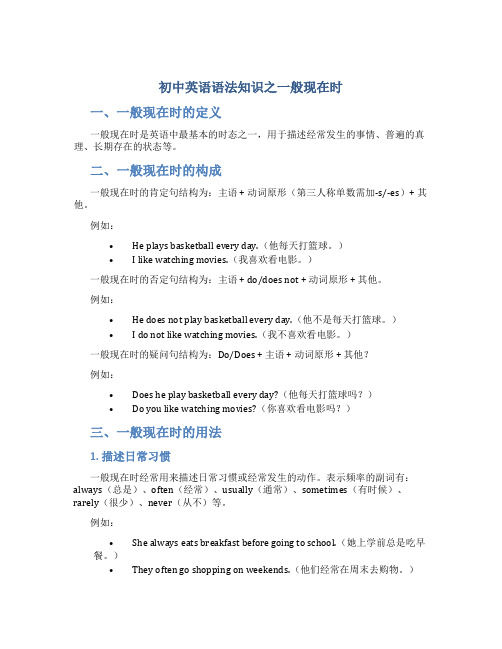
初中英语语法知识之一般现在时一、一般现在时的定义一般现在时是英语中最基本的时态之一,用于描述经常发生的事情、普遍的真理、长期存在的状态等。
二、一般现在时的构成一般现在时的肯定句结构为:主语 + 动词原形(第三人称单数需加-s/-es)+ 其他。
例如:•He plays basketball every day.(他每天打篮球。
)•I like watching movies.(我喜欢看电影。
)一般现在时的否定句结构为:主语 + do/does not + 动词原形 + 其他。
例如:•He does not play basketball every day.(他不是每天打篮球。
)•I do not like watching movies.(我不喜欢看电影。
)一般现在时的疑问句结构为:Do/Does + 主语 + 动词原形 + 其他?例如:•Does he play basketball every day?(他每天打篮球吗?)•Do you like watching movies?(你喜欢看电影吗?)三、一般现在时的用法1. 描述日常习惯一般现在时经常用来描述日常习惯或经常发生的动作。
表示频率的副词有:always(总是)、often(经常)、usually(通常)、sometimes(有时候)、rarely(很少)、never(从不)等。
例如:•She always eats breakfast before going to school.(她上学前总是吃早餐。
)•They often go shopping on weekends.(他们经常在周末去购物。
)2. 表达客观事实或普遍真理一般现在时也被用来表达客观事实或普遍真理。
例如:•The Earth revolves around the sun.(地球绕太阳运行。
)•Water boils at 100 degrees Celsius.(水在100摄氏度沸腾。
初中英语知识点总结一般现在时
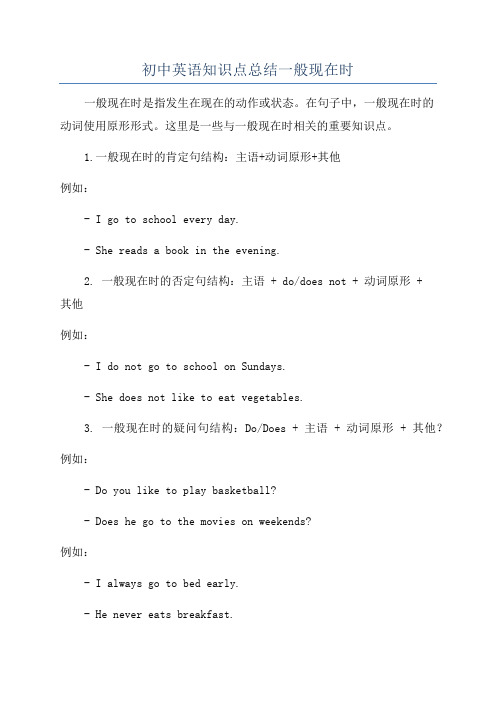
初中英语知识点总结一般现在时一般现在时是指发生在现在的动作或状态。
在句子中,一般现在时的动词使用原形形式。
这里是一些与一般现在时相关的重要知识点。
1.一般现在时的肯定句结构:主语+动词原形+其他例如:- I go to school every day.- She reads a book in the evening.2. 一般现在时的否定句结构:主语 + do/does not + 动词原形 +其他例如:- I do not go to school on Sundays.- She does not like to eat vegetables.3. 一般现在时的疑问句结构:Do/Does + 主语 + 动词原形 + 其他?例如:- Do you like to play basketball?- Does he go to the movies on weekends?例如:- I always go to bed early.- He never eats breakfast.5. 表示客观真理、规律或常识时,一般现在时可用于所有人称,不需要使用助动词do/does。
例如:- The sun rises in the east.- Water boils at 100 degrees Celsius.6. 当主语为第三人称单数时,动词需要变化。
一般情况下,加上-s 或-es。
例如:- She eats lunch at 12 o'clock.- The dog barks loudly.7.部分动词在第三人称单数时需要做变化- go→goes- do→does- have→has例如:- He goes to school by bus.- She does her homework every day.- My mother has a pet cat.8. 当主语为we, they, you或复数名词时,动词不需要做变化。
初中英语语法知识之一般现在时

初中英语语法知识之一般现在时有很多同学分不清时态,时态是一篇文章的主线,如果时态都分不清那我们就分不清事情发生的先后,会对我们做题设障碍,所以今天小编为大家整理了一些时态上的知识,希望能帮到大家。
一般现在时表示现在经常反复发生的动作、存在的状态或习惯性的动作的时态。
一、一般现在时用法如下:1.表示现在的状态: e.g. He’s twelve. She’s at work.2.表经常或习惯性的动作,常与表示频度的时间状语连用。
: eg. I get up at 6:30 every day.He reads English every morning.3.表主语具备的性格、能力和特征。
e.g. I don't like this book.4.表示客观事实和普遍真理。
The earth moves around the sun.5. 在时间状语从句和条件状语从句中,常用一般现在时代替将来时。
eg. I'll write to you as soon as I arrive there.二、一般现在时构成:一般现在时用行为动词的原形,但第三人称单数作主语时,动词要用第三人称单数形式。
第三人称单数形式的变化规则是:1.一般的动词词尾+S。
2.以sh/ch/s/x 结尾的词+es.3.以辅音字母+Y 结尾的把 Y 变成 i,+es。
4.辅音字母+o 结尾的+es.基本结构:1.be 动词肯定句:主语+be(am,is,are)+其它。
如: I am a boy.我是一个男孩。
否定句:主语+ be + not +其它。
如:He is not a worker.他不是工人。
一般疑问句:Be +主语+其它。
如:-Are you a student? -Yes. I am. / No, I'm not.特殊疑问句:疑问词+一般疑问句。
如:Where is my bike?2.行为动词1) 当主语为第一,二人称及复数时,助动词为 do肯定句:主语+动词原形(+其它)。
初中六个英语时态总结归纳

初中六个英语时态总结归纳英语时态是学习英语语法中的重要内容之一,它能够帮助我们准确地描述过去、现在和将来的动作或状态。
在初中阶段,学生通常会接触到六个基本的英语时态,它们分别是一般现在时、一般过去时、一般将来时、现在进行时、过去进行时和将来进行时。
本文将对这六个时态进行总结归纳,帮助读者更好地理解和运用。
一、一般现在时(Simple Present Tense)一般现在时用来表达经常性或习惯性的动作、客观真理、科学事实以及对现在情况的描述。
它的基本形式是主语 + 动词原形(第三人称单数加-s/-es),且没有时间状语的限制。
例如:1. He plays basketball every Sunday.(他每个星期天打篮球。
)2. Water boils at 100 degrees Celsius.(水在100摄氏度沸腾。
)二、一般过去时(Simple Past Tense)一般过去时用来表示发生在过去某个时间的动作或状态。
它的基本形式是主语 + 动词过去式,其中一般过去时的动词过去式有规律和不规律两种形式。
例如:1. She walked to the park yesterday.(昨天她走到了公园。
)2. They saw a movie last night.(昨晚他们看了一部电影。
)三、一般将来时(Simple Future Tense)一般将来时用来表示将来会发生的动作或状态。
它的基本形式是主语 + will + 动词原形,还可以使用be going to + 动词原形的形式。
例如:1. We will have a party tomorrow.(我们明天将举办一个派对。
)2. He is going to study abroad next year.(明年他将出国留学。
)四、现在进行时(Present Continuous Tense)现在进行时用来表示现在正在进行的动作或状态。
初中英语句子的时态
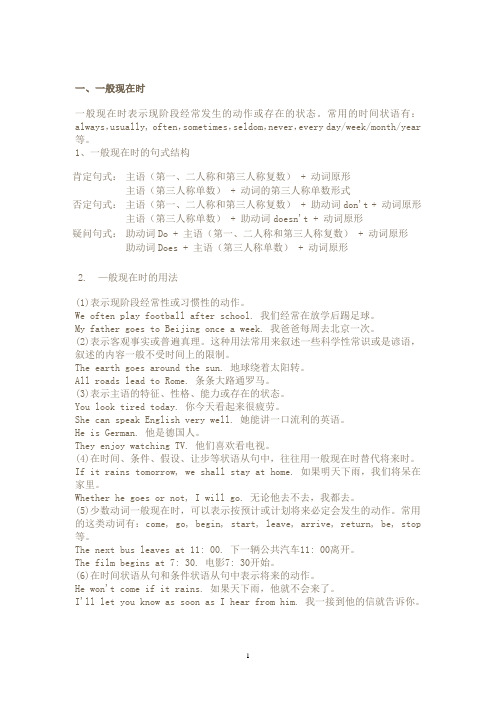
一、一般现在时一般现在时表示现阶段经常发生的动作或存在的状态。
常用的时间状语有:always,usually, often,sometimes,seldom,never,every day/week/month/year 等。
1、一般现在时的句式结构肯定句式:主语(第一、二人称和第三人称复数) + 动词原形主语(第三人称单数) + 动词的第三人称单数形式否定句式:主语(第一、二人称和第三人称复数) + 助动词don't + 动词原形主语(第三人称单数) + 助动词doesn't + 动词原形疑问句式:助动词Do + 主语(第一、二人称和第三人称复数) + 动词原形助动词Does + 主语(第三人称单数) + 动词原形2. —般现在时的用法(1)表示现阶段经常性或习惯性的动作。
We often play football after school. 我们经常在放学后踢足球。
My father goes to Beijing once a week. 我爸爸每周去北京一次。
(2)表示客观事实或普遍真理。
这种用法常用来叙述一些科学性常识或是谚语,叙述的内容一般不受时间上的限制。
The earth goes around the sun. 地球绕着太阳转。
All roads lead to Rome. 条条大路通罗马。
(3)表示主语的特征、性格、能力或存在的状态。
You look tired today. 你今天看起来很疲劳。
She can speak English very well. 她能讲一口流利的英语。
He is German. 他是德国人。
They enjoy watching TV. 他们喜欢看电视。
(4)在时间、条件、假设、让步等状语从句中,往往用一般现在时替代将来时。
If it rains tomorrow, we shall stay at home. 如果明天下雨,我们将呆在家里。
初中英语一般现在时

一般现在时讲解和练习一、定义:一般现在时表示经常或习惯性的动作,也可表示现在的状态或主语具备的性格和能力。
例:(1).表示事物或人物的特征、状态。
The sky is blue.天空是蓝色的。
(2).表示经常性或习惯性的动作。
I get up at six every day.我每天六点起床。
(3).表示客观现实。
The earth goes around the sun.地球绕着太阳转。
二、一般现在时常用时间状语、时间副词in the morning/afternoon/eveningevery week (day, year, month…)on Sundays (Monday, Tuesday…)at night, once a week,.always总是, usually通常, often经常, sometimes有时, never从不三、用法:1.肯定句:(1)句中有be(am,is,are)和情态动词时,①be动词时,主语是I时要用am,主语是you时要用are,其他用is。
②是情态动词时,后面的动词用原型③例:I am a student.You are very beautiful.She is my best friend.He can do his homework by himself.(2)没有be(am,is, are)动词和情态动词:主语为第三人称单数(she ,he ,it )、单数可数名词、不可数名词的,动词要按规则加上s或es;主语是复数可数名词的肯定句,动词用原形。
例:①She(He, It )likes fish. 她(他,它)喜欢鱼。
(主语为第三人称单数)②The table has four legs.桌子有四条腿。
(主语为单数可数名词)③Water boils at 100 degrees Celsius.水在100度沸腾。
(主语为不可数名词)They go to school every day .他们每天都去上学。
初中英语一般现在时
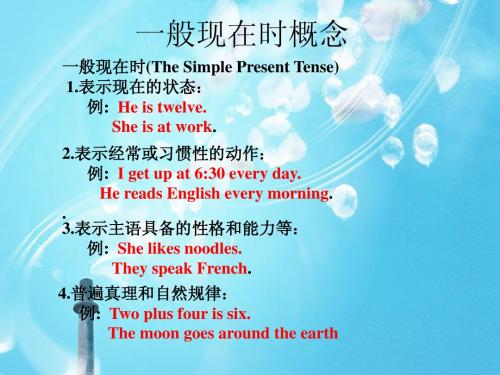
一般现在时
一、系动词be的一般现在时 二、情态动词的一般现在时 三、实义(行为)动词的一 般现在时
• 一、系动词be的一般现在时
1、构成: 主语 + be + 其他
is my friend.
The girl
2、be 包 括 哪 些 ?
is am are 3、 什么时候用is? 什么时候用am? 什么时候用are? 取决于主语是单数 还是复数
We don’t walk to school every day.
10
Complete the sentences. Use the proper verb forms in brackets
plays 1. Jordan _______(play) basketball. play He doesn’t ___________(not play) football. go 2. I _______(go) swimming on Sunday. don’t go But I___________ (not go) shopping. 3. My cousins _______(enjoy) computer games. enjoy
There are some books on the desk. (改为否定句) →There aren’t any books on the desk. →Are there any books on the desk?
and or
• 变否定句时,and要变成or
There is some air and water on the moon . → There isn't any air or water on the moon. He has some brothers and sisters. →He doesn’t have any brothers or sisters.
初中英语语法:一般现在时、一般过去时和一般将来时
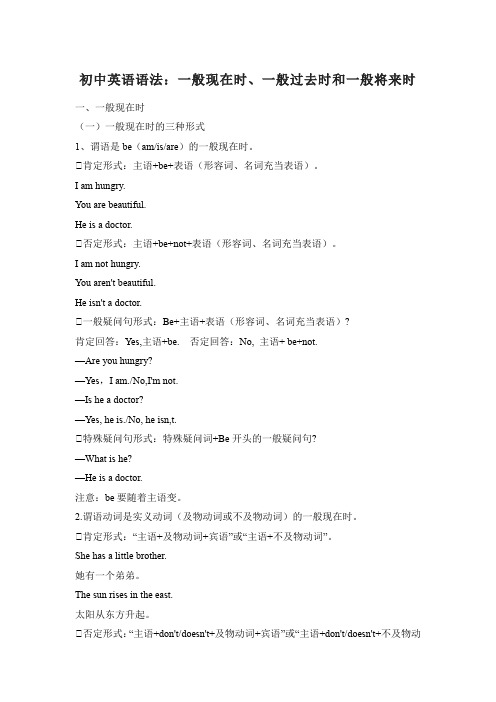
初中英语语法:一般现在时、一般过去时和一般将来时一、一般现在时(一)一般现在时的三种形式1、谓语是be(am/is/are)的一般现在时。
①肯定形式:主语+be+表语(形容词、名词充当表语)。
I am hungry.You are beautiful.He is a doctor.①否定形式:主语+be+not+表语(形容词、名词充当表语)。
I am not hungry.You aren't beautiful.He isn't a doctor.①一般疑问句形式:Be+主语+表语(形容词、名词充当表语)?肯定回答:Yes,主语+be. 否定回答:No, 主语+ be+not.—Are you hungry?—Yes,I am./No,I'm not.—Is he a doctor?—Yes, he is./No, he isn,t.①特殊疑问句形式:特殊疑问词+Be开头的一般疑问句?—What is he?—He is a doctor.注意:be要随着主语变。
2.谓语动词是实义动词(及物动词或不及物动词)的一般现在时。
①肯定形式:“主语+及物动词+宾语”或“主语+不及物动词”。
She has a little brother.她有一个弟弟。
The sun rises in the east.太阳从东方升起。
①否定形式:“主语+don't/doesn't+及物动词+宾语”或“主语+don't/doesn't+不及物动词”。
She doesn't have a little brother.她没有弟弟。
I don't eat every morning.我每天早晨都不吃饭。
①一般疑问句形式:“Do/Does+主语+及物动词原形+宾语”或“Do/Does+主语+不及物动词原形”。
肯定回答:Yes,主语+do/does. 否定回答是:No, 主语+ don't/doesn't.—Do you eat every morning?—Yes, I do./No, I don't.—Does she have a little brother?—Yes, she does./No, she doesn't.①特殊疑问句:特殊疑问词+do/does开头的一般疑问句?What do you like?When do you go to school?注意:根据主语确定用do还是does。
初中英语七大时态的概念

七大时态的概念1.一般现在时一般现在时表示经常性、习惯性的动作或状态,常与always,often,sometimes等连用。
其基本句式为:主语+动词原形+其他。
错误示例:He always eat breakfast at seven.(错)正确示例:He always eats breakfast at seven.(对)2.现在进行时现在进行时表示此时此刻正在进行的动作或状态,其基本句式为:主语+be动词+动词现在分词+其他。
错误示例:They are having a meeting tomorrow.(错)正确示例:They are having a meeting now.(对)3.现在完成时现在完成时表示过去发生的动作或状态对现在产生的影响或结果,其基本句式为:主语+have/has+动词过去分词+其他。
错误示例:I have buy a book.(错)正确示例:I have bought a book.(对)4.一般过去时一般过去时表示过去某个时间点或过去经常发生的动作或状态,常与last week,yesterday等连用。
其基本句式为:主语+动词过去式+其他。
错误示例:They went to the park yesterday.(错)正确示例:They went to the park last week.(对)5.过去进行时过去进行时表示过去某个时间点正在进行的动作或状态,其基本句式为:主语+was/were+动词现在分词+其他。
错误示例:She was having a shower at nine o’clock yesterday.(错)正确示例:She was having a shower at nine o’clock yesterday morning.(对)6.过去完成时过去完成时表示过去某个时间点之前已经完成的动作或状态,其基本句式为:主语+had+动词过去分词+其他。
九年级英语常见一般现在时最全总结

【答案】C
【解析】【分析】句意:如果你想取得好成绩,你应该努力学习。根据be supposed to do sth.,应该做某事,固定搭配。主语是you,be要用are,故选C。
【点评】考查固定搭配be supposed to do sth。注意后接不定式形式。
【答案】D
【解析】【分析】第一个空前面有动词is,填doing构成现在进行时,第二个空often是一般现在时的标志,主语he是第三人称单数,动词用三单形式does,故选D。句意是:我弟弟正在做家庭作业。他经常在家里做家庭作业。
【点评】本题考查现在进行时和一般现在时的用法。
2.Millions of people _________ the Great wall every year.
A. dare not to go B. dares not go C. doesn't dare to go D. doesn't dares go
【答案】C
【解析】【分析】句意:晚上她不敢一个人出去。dare可以作情态动词也可以作行为动词,作情态动词时,后面直接跟动词原形,没有人称与数的变化,构成否定时直接在dare后加not,作行为动词时后跟动词不定式,构成否定需要助动词,故答案是C。
A. visited B. visit C. will visit D. are vesting
【答案】B
【解析】【分析】句意:成千万的人每年参观长城。根据every year,可知句子时态为一般现在时,故答案是B。
【点评】考查一般现在时,注意根据时间状语确定句子的时态。
初中英语语法一般现在时全解
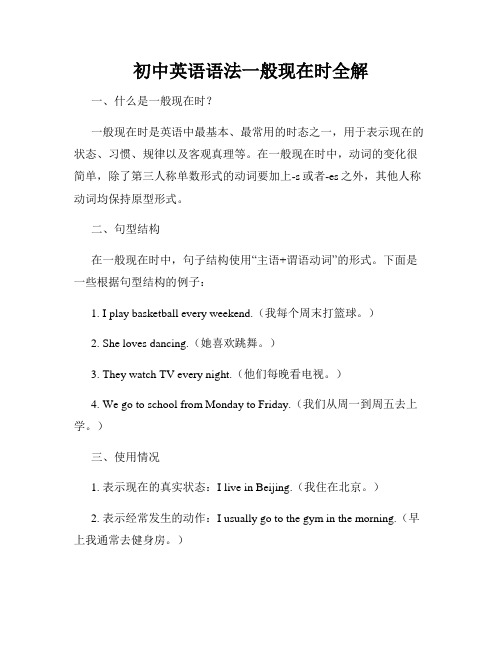
初中英语语法一般现在时全解一、什么是一般现在时?一般现在时是英语中最基本、最常用的时态之一,用于表示现在的状态、习惯、规律以及客观真理等。
在一般现在时中,动词的变化很简单,除了第三人称单数形式的动词要加上-s或者-es之外,其他人称动词均保持原型形式。
二、句型结构在一般现在时中,句子结构使用“主语+谓语动词”的形式。
下面是一些根据句型结构的例子:1. I play basketball every weekend.(我每个周末打篮球。
)2. She loves dancing.(她喜欢跳舞。
)3. They watch TV every night.(他们每晚看电视。
)4. We go to school from Monday to Friday.(我们从周一到周五去上学。
)三、使用情况1. 表示现在的真实状态:I live in Beijing.(我住在北京。
)2. 表示经常发生的动作:I usually go to the gym in the morning.(早上我通常去健身房。
)3. 表示普遍真理或客观规律:The sun rises in the east.(太阳从东方升起。
)4. 表示评论、陈述、想法等:I think English is an interesting subject.(我认为英语是个有趣的科目。
)四、一般现在时的注意事项1. 第三人称单数形式的动词要加上-s或者-es:He reads books every day.(他每天阅读书籍。
)但是要注意规则动词的变化,如do变为does。
2. 否定句需要在谓语动词前加上助动词do或does,并在其后加上not:I do not like coffee.(我不喜欢咖啡。
)She does not listen to music.(她不听音乐。
)3. 疑问句需要将助动词do或does提前至主语之前:Do you play tennis?(你打网球吗?)Does she go to school by bus?(她坐公交车去上学吗?)4. 当主语为第三人称单数时,疑问句直接用助动词does,无需加s:Does he like ice cream?(他喜欢冰淇淋吗?)五、总结一般现在时是英语中最基础、最常用的时态之一,用于表示现在的状态、习惯、规律以及客观真理等。
- 1、下载文档前请自行甄别文档内容的完整性,平台不提供额外的编辑、内容补充、找答案等附加服务。
- 2、"仅部分预览"的文档,不可在线预览部分如存在完整性等问题,可反馈申请退款(可完整预览的文档不适用该条件!)。
- 3、如文档侵犯您的权益,请联系客服反馈,我们会尽快为您处理(人工客服工作时间:9:00-18:30)。
We go to school every day. We clean the classroom after class.
We sometimes play football on the playground.
4、我们在学校吃晚饭。 、我们在学校吃晚饭。 5、他喜欢英语。 、他喜欢英语。
3、有时我们在操场上踢足球 。 、
对下列句子画线部分提问: 对下列句子画线部分提问: 1. I get up at six o’clock.
When do you get up?
2. They usually go to the park on Sunday.
What do they usually do on Sunday?
3. The elephants like eating fruits.
看小说 听音乐 看电影 去音乐会 去看足球赛 玩游戏 弹钢琴 上网 说英语 去公园
read novels listen to the music go to the cinema go to the concert go to watch the football match play games play the piano go online speak English go to the park
always usually
He I
often sometimes never
定义: 定义: 一般现在时: 、表达经常性或习惯性的动作。 一般现在时:1、表达经常性或习惯性的动作。 2、表示现在的状态。 、表示现在的状态。 例如: 例如: 1、我们每天都上学。 、我们每天都上学。 2、下课后我们打扫教室。 、下课后我们打扫教室。
What do the elephants like eating?
4. He sends two emails every week.
How many emails does he send every week? How often does he send two emails?
5.I often make travel plans on the Internet.
He I
at…
2:Talk about the things you always/ usually /often /sometimes/never do in your life. read novels reads novels listen to the music listens to the music go toto the cinema goes the cinema go toto the concert goes the concert go toto watch the football match goes watch the football match play games plays games play the piano plays the piano go online goes online speak English speaks English go toto the park goes the park
Let’s correct:
1. I goes to school at six every day. go 2. He doesn’tlike playing football. don’t 3. They likes playing games. like 4. Daming watches TV in the evening. watchs 5. Does he usually have a party? has 6. What do theydoon Sunday? 7. Tony goes always to school at eight o’clock. 8. What they eat in the party? 9. Lily haves lunch at school. has 10. What do his parents usually gives him ? give
Let’s talk: 1:Talk about your school day: get up gets up have breakfast has breakfast start lesson starts lesson have lunch has lunch have a break has a break do sports does sports have dinner has dinner do homework does homework watch TV watches TV go toto bed goes bed
does 动词三单的变化: 动词三单的变化: 1、一般动词后加 ,如:reads,plays,works,makes 、一般动词后加s, 2、以 s,x,ch,sh, 结尾,后加 如:watches, 结尾,后加es. 、 3、以辅音字母加 结尾 一般加 ,如:does,goes 结尾,一般加 、以辅音字母加o结尾 一般加es 如 4、辅音字母+y结尾的单词 去y,加ies,如:worries 、辅音字母 结尾的单词,去 加 如 结尾的单词 studies
We have dinner at school. He likes English. He is a student.
6、他是一个学生。 、他是一个学生。
Let’s speak: see which group can say more.
Monday Time 8:00-8:45 9:00-9:45 10:00-10:45 11:00-12:00 12:00-2:00 2:00-3:00 3:15-4:00 Art Class meeting Class Math English Chinese Music 30 12 26 42 Lunch and noon break 35 20 0 15 12 11 10 0
Revision lesson:
The Simple Present Tense 一般现在时
Let’s remember: Do you remember the words in your life? 你记得你生活中的一些常用词汇吗? 你记得你生活中的一些常用词汇吗?
起床 吃早饭 上课 吃午饭 休息 做运动 吃晚餐 做家庭作业 看电视 上床睡觉 get up have breakfast start lesson have lunch have a break do sports have dinner do homework watch TV go to bed
Listening game!
Do you know?
第一人称和第二人称的一般现在时,其谓语动词没有形式的变化, 第一人称和第二人称的一般现在时,其谓语动词没有形式的变化, 其否定形式一般是在谓语动词前 don’t,一般疑问句在句前加do 但当主语是第三人称单数时,谓语动词形式有变化, 但当主语是第三人称单数时,谓语动词形式有变化,一般在动词 末尾加s,否定句在行为动词前加doesn’t, 一般疑问句在句前加
请你根据杰克的兴趣爱好, 请你根据杰克的兴趣爱好,为杰克设想一个充满乐趣的 星期天,(包括早, ,(包括早 他都做了些什么。 星期天,(包括早,中,晚)他都做了些什么。要求用 字数8-10句。 一般现在时来写 ,字数 句 Like Dislike run play football go shopping go to the cinema watch TV play computer games KFC,noodles,oranges speak English
4.He gets up very early.
He doesn’t get up very early. Does he get up very early? Yes, he does/ No, he doesn’t.
5.The panda eats bamboo.
The panda doesn’t eat bamboo. Does the panda eat bamboo? Yes,it does/ No, it doesn’t.
What do you often do on the Internet?
6.He has lunch at school.
Who has lunch at school?
Where does he have lunch?
Let’s listen: Listen to the tape,try to fill the blanks. When my mother has a birthday,she often has birthday ___a meal with the family. She ____concerts. My father usually likes buys _____concert tickets and they go ____to the theatre. When my father has a birthday, he usually has a party. invites He usually has a party, he _____all his friends. My mother dance _____ play makes lots of party food. We _____music and we _____. We don’t go to bed early.
On Monday…I have…**students like…***don’t like…
Let’s practise:
1.将下列句子改成否定句,一般疑问句并回答: 将下列句子改成否定句,一般疑问句并回答: 将下列句子改成否定句 1. I speak English. I don’t speak English. Do you speak English? Yes, I do/ No ,I don’t.
